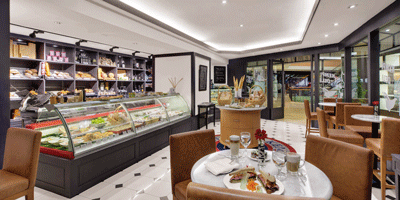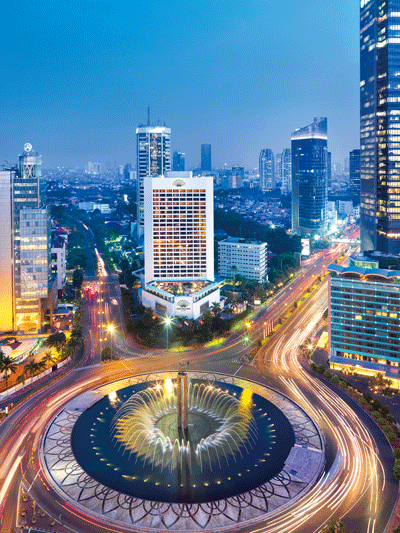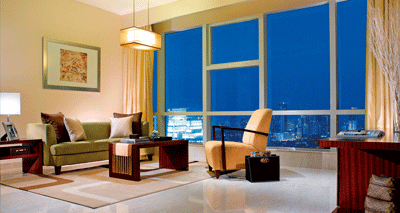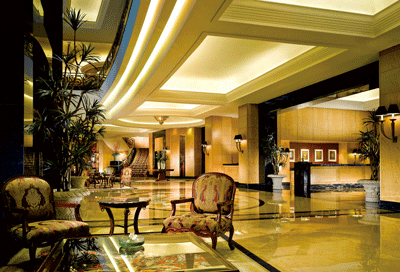If China and India were until recently the sleeping giants of the world economy, Indonesia seemed positively comatose.
Following the overthrow of the Suharto dictatorship in 1998, the country was wracked by political instability, a number of terrorist atrocities, and the ever-present phenomenon of corruption.
Today the picture seems stunningly different. The country has made significant steps in consolidating its fledgling democratic system. President Susilo Bambang Yudhoyono won a second five-year term in 2009 and is presiding over a booming economy.
“SBY”, as he is known, has pledged to boost public spending to achieve average annual growth of 6.6 per cent in the remainder of his term.
Already this year the rupiah has risen by almost 4 per cent on the foreign exchange markets and the Jakarta-based national stock exchange, IDX, rose by around 13 per cent in the first quarter. Last year, IDX registered the second largest growth of any Asian exchange.
One of the advantages of the country’s huge population of approximately 230 million is that domestic demand, which accounts for 68 per cent of Indonesia’s GDP, is strong and relatively unaffected by international financial storms.
Yet, Indonesia’s past reputation still weighs against it. It has, so far, failed to excite the buzz that has surrounded China and India, or even Vietnam, for that matter.
Even so, Indonesia’s rise has not gone entirely unnoticed.
Chris Wren is the executive director of the British Chamber of Commerce in Indonesia. The BritCham is one of the largest overseas business organisations in the country, with members from a whole host of industry sectors.
A long-time expatriate with 15 years of experience in the county, he sees the country entering a new era.
“There is definitely more interest in Indonesia as a business centre. Some see Indonesia as being an alternative, lower-cost hub for Southeast Asia. Hotel deals are a fraction of Singapore and lower than most neighbours. Office accommodation is among the lowest in Southeast Asia, as are city centre apartments, many of which can be leased on flexible and shorter terms. It is certainly geographically strategic, located in between China and India.”
Jakarta is also well resourced for business people, with excellent translation and secretarial services, legal back-up and serviced offices. Wren notes that “the only negative sometimes heard is the cost and quality of internet bandwidth”.
One other negative factor in doing business in Jakarta is the time you can spend in cars and taxis between meetings. Most regular visitors to the city will recommend choosing a hotel based on where most of your appointments will be simply to cut down on travelling time.
Despite the introduction of a fast-lane bus system, Jakarta’s traffic jams remain a sore point for many business travellers to the city. So much so that some enterprising Jakartans, known as tukang parkir, helpfully direct cars to parking spots or assist them in navigating through jams in return for 1,000 rupiah (US$0.11) tips. It’s even been known for the parkirs to ask drivers to park with their handbrakes off, so that the cars can be pushed in and out of position at tight parking spots as other drivers arrive and leave.
Wren says one of the key things for overseas business visitors to do is to understand the mindset of their Indonesian partners, staff or clients.
“Indonesia is not a make-profits-quick market. Understand exactly what you plan to do here and plan the execution in the context of the longer term.
“The barriers to doing business, such as legal uncertainty, will not go away in the short term. Accept that the barriers prevail, factor them into strategic decision-making. In the case of legal uncertainty, the best prevention is to find the right local partner. That is a challenge.
“An individual or company must not expect to get to know this market on the back of a couple of short trips and a handful of meetings. Be prepared to financially invest in in-country experience and spend time building relationships. Engaging with the most active chambers in Jakarta, of course I’m talking about the BritCham here, will fast-track business networks and in-country knowledge.”
Renewed business travel has also encouraged a significant investment in the high-end accommodation sector.

The renovated is reporting consistently rising occupancy, says Hanny Wahyuni, who was director of marketing communications at the time of interview.
“The Hotel Indonesia Kempinski is essentially a business hotel. It’s difficult to spot one particular source market, we have corporate travellers from Japan, Europe, US as well as most parts of Asia.”
The Kempinski’s European heritage is also being used to good effect.
“We’re also seeing more business from German businesses in the locality. The German embassy is close by and we’ve even seen this reflected in our food and beverage trade. Our bakery has seen orders for German-style breads and pastries and we’ve just opened the Paulaner Brauhaus, a German pub, that can seat over 300 people as well as provide a venue for events. It even has a small meeting room.”
The hotel’s dramatic makeover is expected to end soon when the final phase of the renovation, the addition of new meeting space, is finally completed.
The Hotel Indonesia Kempinski is the second deluxe hotel in the city’s Golden Triangle, commercial and diplomatic centre, to undergo a major refurbishment. Its neighbour, the Mandarin Oriental Jakarta, reopened last year with a stylish top-to-bottom redesign.

Alexander Naoyan, managing director of the luxury boutique hotel The Dharmawangsa, says his 100-suite hotel was also benefiting from the improved economic situation.
“We’re a relatively small property and also one of the most expensive in the city. We tend to, therefore, get the higher-end corporate travellers, the CEOs, global chiefs and so on. The oil and gas sector is performing well but so are areas such as the automotive industry.”
Aside from its guestrooms, there is also a block of 80 luxury serviced apartments within the grounds of The Dharmawangsa. Next year, a second tower with 89 residences will open.

Paul Rushton, cluster director of marketing at the Marrriott’s four properties in Jakarta, The Ritz-Carlton Jakarta, The Ritz-Carlton Jakarta Pacific Place, JW Marriott Hotel Jakarta and The Mayflower – Jakarta, Marriott Executive Apartments, also confirms that the serviced apartment sector was surging across the city.

As companies look to open or reopen local offices, overseas business people on medium and long-term assignments or temporary relocations often prefer the greater flexibility and privacy of serviced residences, while benefiting from greater facilities and security.
Confidence in the city’s future is reflected in the decision to open a 180-room Raffles Jakarta in around 18 months’ time. The new property will be located in Ciputra World Jakarta, a mixed-use complex in the city’s business district. The hotel will also feature a 2,500sqm ballroom and meeting spaces as well as a 1,100sqm Raffles Amrita Spa
Indra Sukirno, director of the Jakarta Convention and Exhibition Bureau, says that the business events sector was also picking up. Recent domestic trade exhibitions had seen a spike in demand and greater interest from overseas exhibitors and buyers. The week-long Indonesia International Motor Show has been forced to relocate to the Jakarta International Expo (JIExpo) grounds this year as it had now outgrown the space available at the Balai Sidang Jakarta Convention Centre, where it has been held for almost a decade.
“This year we see that the current meetings situation in Jakarta has progressed so much compared to 2009. This is mainly due to the efforts that the government enforced in regards to combating terrorism, fighting against corruption and the affordable luxury products and services the destination offers,”
she says.
So can Indonesia continue its upward path?
BritCham’s Wren believes so, although certain obstacles must be overcome. “Average growth levels of 6 to 7 per cent over the next five years are expected as a minimum. But some factors inhibiting growth have to be improved such as poor infrastructure and systemic bottlenecks.
“Nonetheless, the financial infrastructure is well developed and sound. The top 10 banks have better capital adequacy than many developed countries. The last periods of regional and global volatility were much shorter in Indonesia and the currency is stable,” Wren says.
Visa and Entry Issues
Business travellers are most likely to enter the country through Jakarta’s Soekarno-Hatta airport, named after the country’s founding president and vice-president.
The procedure is clumsy and bureaucratic. First, you must queue to pay the fee, then you are given a voucher and join a second queue to be given your stamp. It is not uncommon to see three immigration clerks in a single booth, processing one visa at a time.
The stamp takes up a whole passport page, so make sure you have at least one free page left.
It is best to pay in either Indonesian rupiah or US dollars, the exchange rate for other currencies is unattractive.
Passport-holders from 64 different states and territories are eligible for visa on arrival. Others must apply to an Indonesian embassy or consulate before their trip.
Earlier this year, Indonesia changed its visa-on-arrival rules. Having introduced a two-tier payment system some years ago, priced at US$10 for seven days and US$25 for up to 30 days, the immigration department eliminated the first category, much to the indignation of the country’s tourism ministry, which appeared not to have been consulted on the change.
Visa extensions are possible again at US$25 for up to 30 days but only once.
For regular business visitors to Indonesia, however, another option is available, the multiple entry business visa (MEBV). Since this requires company sponsorship and a great deal more paperwork, it is not initially as convenient as the single entry visa on arrival. However, this could pay off in the long run as this visa permits stays of up to 60 days per visit and allows as many entrances and exits as you need. Prices for the MEBV vary from country to country and are issued by the relevant embassy or consulate.
It’s also important to stress that a MEBV does not entitle you to work in Indonesia.
Visitors are recommended to use only taxis from the Blue Bird group. The company has a hard-won reputation for honesty and security.
There are plans to build a rail link between Soekarno-Hatta International Airport and the city but these have been long delayed. The 30km line would cost around US$400 million and would link the airport with Manggarai rail station in Jakarta.
For those connecting to domestic flights, it’s also worth noting that there are two separate terminals. While flag-carrier Garuda uses the main terminal, the second terminal is primarily used by low-cost carriers, such as AirAsia operating domestic routes and is reached by taking an airport shuttle bus. However, be aware that the stops are not well signposted and you may need to ask a staff member inside the main terminal for help in finding the right spot.
Business etiquette
Doing business in any country can be an exercise in cultural misunderstandings and unintended faux pas.
The BritCham’s Chris Wren remarks that foreign visitors often come with misconceptions of the country “where 88 per cent of the population are Muslim”.
Western business attitudes where straight talking and punctuality are considered virtues are out of place, he says.
“Avoid showing your frustration at their apparent lack of business etiquette. Indonesians can often be late, use mobiles during meetings and bring other uninvited people to join your meetings.
“From a practical point of view only, avoid business trips during the holy month of Ramadan and immediately after the Idul Fitri holiday.”
As for safety concerns, Wren is phlegmatic.
“Foreign residents of Indonesia do not consider the level of risk as high as in the US or UK. Visible security around main hotels, prominent public buildings and Central Business District office accommodation is high. Some visitors find this intrusive, but most accept it as a sensible deterrent. The practical advice is to be vigilant in a way that you would in any airport. Many security and risk management companies offer more specific, or regional advice.”








